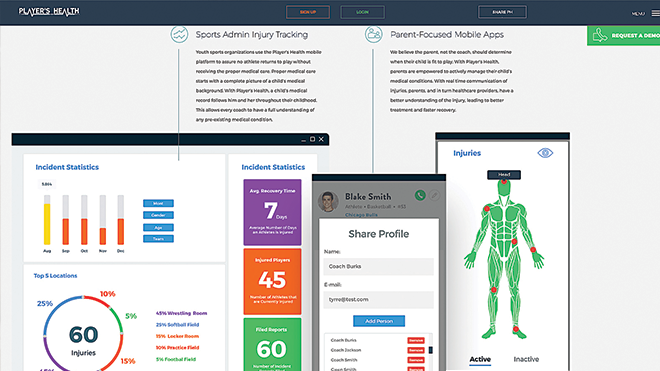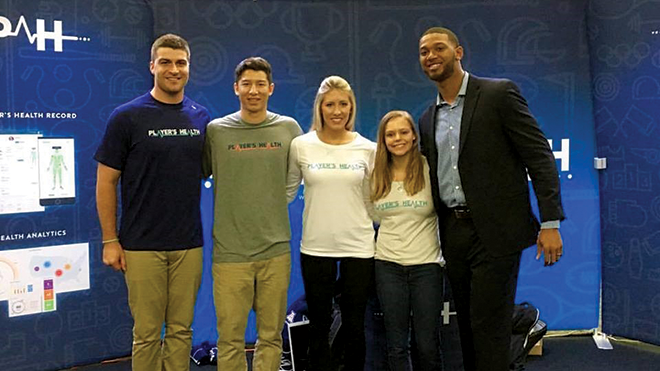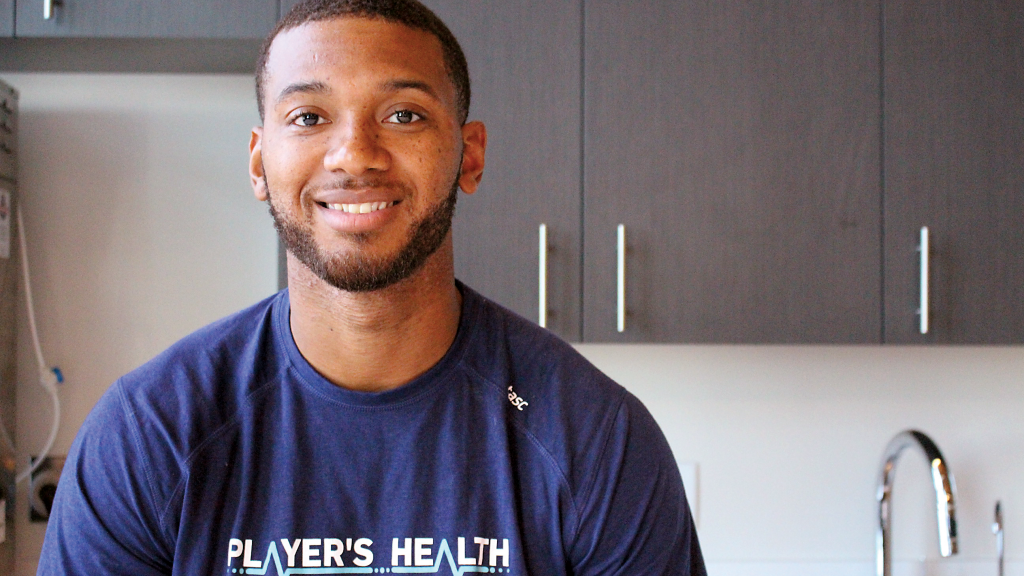Tyrre Burks ’10 was 15 years old when a sports injury changed his life.
Burks was knocked out by a violent hit during his first varsity football game. It was a scary moment, but he recovered physically and went on to play at Winona State and professionally. What stuck with him was his experience — he believed it demonstrated a need for a system that would help teenage athletes, parents, coaches, and medical personnel deal with injuries.
That idea inspired Burks to develop Player’s Health (playershealth.com), an application that has pioneered tracking and sharing of youth sports injuries. Burks’ company received the top prize at Google Demo Day this past May in San Francisco and now has more than 300,000 users worldwide.
Burks, who grew up in the Chicago area, remembers every detail of the play that easily could have ended his career and caused a debilitating injury. Playing wide receiver, he went down to scoop up a low pass and was hit at the same time, bending his neck awkwardly.
“I got hit and was on the turf for 20 minutes,” Burks said. “I could not move. I was paralyzed. Miraculously, the feeling started to come back.”
Burks was not taken for further medical treatment, there was no documentation of the injury, and his mom was not informed about what had happened. Burks was back on the field practicing the next day.
“It was not my coach’s fault, he didn’t know,” Burks says. “A coach can teach the game and inspire kids, but when it comes to health and welfare, that’s not what they do. That’s the gap we’re trying to close here.”
The Player’s Health app starts with a medical profile for each athlete, including information about past injuries, medications, and allergies, and is updated as necessary.
For example, Burks said, a football player might suffer a concussion late in his season, then begin hockey or basketball season, and that coach will be informed automatically through the app. In the past, he said, those situations often went unnoticed.
Burks employed doctors, trainers, and tech experts to develop the platform, which is HIPAA (Health Insurance Portability and Accountability Act) compliant. Player’s Health headquarters is in Minneapolis, with another office in Chicago. Burks had 13 full-time employees and interns at the start of the summer of 2016 and planned to double that in just a few months.
“It comes from my experience with injuries,” said Burks, who played professional football in the Canadian Football League and Europe before neck, back, and leg injuries forced him out. “I saw that we need a better injury surveillance solution.”
Burks established the prototype for Player’s Health, a platform called Team Interval, while still playing for Saskatchewan in the Canadian Football League. He invested $80,000 of his own money as capital and raised another $300,000 while building
a subscriber base of 8,000 athletes. Team Interval made a $27,000 profit, which Burks didn’t consider strong enough. He was close to giving up on his idea.
“I was about to shut it down when I was driving home and heard a story on the radio about a cheerleader in Wisconsin who had fallen and fractured her skull,” Burks said. “Then a bunch of things went wrong with how the injury was handled.”
Burks decided to push forward, and went online with the Player’s Health app in 2015. The strong response confirmed that his idea’s time had come.
USA Wrestling, with 220,000 registered athletes, and USA Boxing, with 30,000, were among the first organizations to buy the platform. Burks’ goal is one million users by the beginning of 2017. As of mid-2016, the company had raised $1.5 million in capital.
“We want to be the gold standard for regulations in youth sports,” Burks said.
Burks, a wide receiver, played football for two years at Harper College (Ill.), before transferring to Winona State. While visiting campus, meeting potential Warrior teammates, and spending time with Coach Tom Sawyer, Burks knew he’d found the right place.

Alex Jensen, business development/customer success; Dylan Wong, business development; Kari Moxness, director of implementation; Madeleine Sendek, intern; and Tyrre Burks at the National Athletic Trainers Association Convention
Burks also met his future wife, Jennie Miller, while at WSU. The couple have two children and live in the Twin Cities.
“I just thought that at Winona State, it was people first,” Burks said. “There are just good people all around you and a great support network. There wasn’t a Friday night before a home football game that I wasn’t invited to someone’s house for dinner. They want to get to know you personally, it’s just what the culture is. Maybe at other colleges, the focus is on career and money, but from the Winona standpoint, it’s ‘are you a good person first,’ and everything falls into place after that.”
Burks played for the Warriors in ‘07 and ’08, helping the team win an NSIC championship. He earned a degree in organizational psychology while catching the eyes of professional football scouts, and began his pro career in Germany before joining the Canadian Football League. Injuries forced him to set aside his athletic career at age 24.
It didn’t stop his competitive desire.
“I love what I do,” he said. “It doesn’t feel like work. The 20-hour days are part of being an entrepreneur, to be able to create something like this that has value, and having a great team around me, it’s almost like being back on the football team.”


